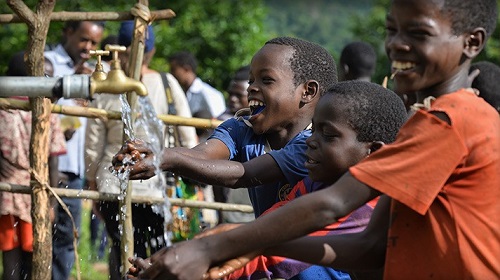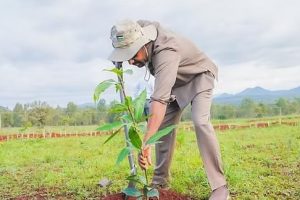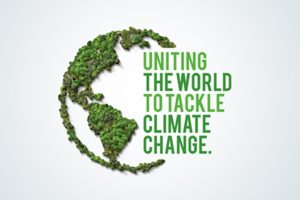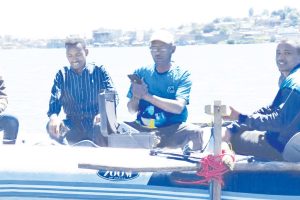
BY GIRMACHEW GASHAW –
The COWASH (Community-Led Accelerated WASH) project (COWASH) is a bilateral WASH project between Finland and Ethiopia since 2011. It covers 76 woredas in five regions across Ethiopia.
The development objective of the programme is to improve the health and well-being of people in rural and urban communities in an equitable and sustainable manner by increasing access to water supply and sanitation and adoption of good hygiene practices.
The purpose of the Project was to support the acceleration of the rural water and sanitation targets attainment through the establishment of an enabling environment and implementation of Community Managed Project (CMP) interventions in selected rural areas of Ethiopia.
The implementation strategy of COWASH is based on the CMP approach. When the CMP approach is applied, communities are fully responsible for the water supply development process, through planning, financial management, construction management and maintenance management.
Phase I COWASH was implemented at the Federal level through its Federal Technical Assistance Team (FTAT) housed in the Ministry of Water, Irrigation and Electric. (MoWIE). At regional level the project was implemented through Regional Water Bureaux, coordinated by RWSCs and assisted by Regional Support Units (RSU). RSU staffs were employed by the Regional Water Bureaux.
Component 1 and capacity building of Component 2 were financed by Ethiopian government, whereas investments were financed by the Regional Governments. There were minor deviations from this principle in nine Amhara and Benishangul-Gumuz regions where some parts of the investments were also financed by the government and in SNNP where some part of capacity building was financed by the Regional Government.
According to study document of Finland Embassy, the capacity building in COWASH followed a cascading principle where trained regional professionals transfer their knowledge down to the zone and woreda staffs and woreda staffs will further train communities to implement their own projects. The supervision and capacity building was led by RSUs. The revised Phase I target was to provide potable water supply access to 1,146,750 rural people. This was slightly exceeded, as the reported total number of rural people having potable water supply under COWASH was about 1,191,000 at the end of Phase I.
At least the same number – around 1.2 million people – had been provided with access to basic sanitation. The target of 215 open defecation free (ODF) kebeles was also exceeded: in COWASH woredas a total of 337 kebeles were declared ODF with the support from COWASH and the health sector. Furthermore, the total number of institutional latrines constructed in Phase I was 107 – 91% of the target. COWASH succeeded in inclusion of CMP approach as part of WIF, OWNP and One WASH Programme Operational Manual (POM).
The CMP approach is well known nationally and internationally. However, CMP is currently included neither in CWA POM I nor in POM II. The Project Document (PD) was revised in 2013 and streamlined with the new One WASH principles, and COWASH (II) was extended until 2016. After revision, the budget totaled EUR 55 million, comprising MEUR 22 from GoF, MEUR 23 from GoE and MEUR 5 from the communities in kind.
COWASH Phase III was designed to cover a period of July 2016 – end of June 2019, but it has been extended by one year until the end of June 2020. The total GoF budget for COWASH III is EUR 14.5 million, comprising the initial budget of MEUR 11, carryovers of EUR 2,780,237 from Phase II, and additional budget for extension 2019-2010 of MEUR 0.7. The budget from GoE is METB 513 (about MEUR 23) and METB 71 (about MEUR 3) from communities.
The targeted impact of Phase III is to contribute to achieving GTP II targets for the WASH sectors in terms of water, S&H access coverage and quality of service delivery in selected rural areas in five regions by using the CMP approach. The physical target was set at (i) about 1.1 million new beneficiaries through supporting construction of about 5,000 – 6,000 new improved community water supply systems and water points; (ii) about one million people improving their sanitation access and usage; and (iii) 140 000 new beneficiaries will be served by better institutional WASH facilities in about 280 institutions On May, 2021, the fourth phase of COWASH project targets to create water supply for more than 1 million people kicked off.
The water supply, sanitation and hygiene project to run from April, 2021 up to December, 2024 will be implemented in 99 Woredas and 37 Zones of Amhara, Tigray, SNNP, Oromia, Benishangul-Gumuz and Sidama regions.
The Government of Finland and the regional governments of Ethiopia have allocated a total of 41 million Euros, of which the regional governments contributed 22.6 million Euros and the Government of Finland 18.4 million Euros.
Kicking off the project today, Water, Irrigation and Energy State Minister Negash Wagesho said the ministry will undertake the project’s physical implementation to contribute to the efforts to ensure inclusive water supply, especially in rural areas of the regions.
He commended the regional governments commitment for financing and collaborating for the implementation of the project.
Finance State Minister Yasmin Wohabrebbi said on her part Ethiopia sees access to clean water as basic right to its citizens.
Yasmin stated that “Ethiopia recognizes water and sanitation not only as economic good, but also basic right for all citizens to have access to clean water and sanitation services across the country.”
The ministry will manage the finance disbursement to the regions with an improved channel, transparency and accountability, she added.
Finland Ambassador to Ethiopia, Outi Holopainen said her country is committed to cooperating with the government to implement the flagship bilateral project that benefits the communities with improved water, sanitation, and hygiene.
“ This is one of the most successful projects supported by Finland; and it’s also one of the most successful projects managed by Finnish and Ethiopian citizens,” she noted.The Finnish Embassy in Ethiopia and the foreign affairs ministry of Finland are committed to implementing this project to accelerate water, sanitation and hygiene access for the people, she added.
COWASH, has so far benefited close to 5 million people and this phase targets to create water supply for 1.1 million people using safe water supply.
The Ethiopian Herald June 18 /2021





